Government mischief
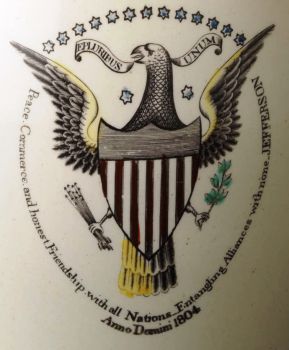 “Government prohibitions do always more mischief than had been calculated”.
“Government prohibitions do always more mischief than had been calculated”.
These prophetic words were written by Albert Gallatin, Secretary to the U.S. Treasury, in a cautionary letter to President Thomas Jefferson, December 18, 1807. Four days later, Congress approved "An Embargo laid on Ships and Vessels in the Ports and Harbours of the United States". Jefferson’s election promise, “Peace, Commerce, and honest Friendship with all Nations – Entangling Alliances with none”, proved an impossible dream. With a renewed outbreak of war between England and France in 1803, both these countries imposed maritime restrictions creating a continental blockade of trade that affected neutral as well as enemy shipping. America was subject to additional hardship as Britain continued to board her ships and impress seamen into British service. With American honor compromised and maritime trade drastically curtailed, Jefferson’s Embargo Act of 1807 prohibited U.S. ships from trading with Europe and banned the importation of manufactured goods from Britain. Unfortunately, as Gallatin had predicted, there were unforeseen consequences, and America suffered extensive financial and maritime losses, from which some seaports in New England never recovered.
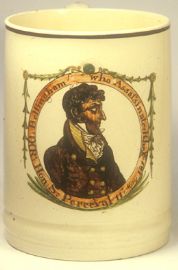 Trade restrictions imposed by the British were mainly Orders in Council, which increasingly affected not only enemies and neutrals, but damaged the British economy. The industrial strength of the nation lay in its ability to export to worldwide markets, particularly to America, and British manufacturers, merchants, and working people struggled to survive with no access to international trade. From the U.S. and from many areas of Britain there was a growing demand for repeal of the Orders in Council. A Government debate to discuss the matter was to take place on 11 May 1812. As the British Prime Minister, Spencer Perceval, entered Parliament he was shot and killed by John Bellingham, a distressed Liverpool merchant. This, the only assassination of a British Prime Minister, was commemorated by Staffordshire potters in a range of printed designs, almost all of which featured a portrait John Bellingham rather than Spencer Perceval.
Trade restrictions imposed by the British were mainly Orders in Council, which increasingly affected not only enemies and neutrals, but damaged the British economy. The industrial strength of the nation lay in its ability to export to worldwide markets, particularly to America, and British manufacturers, merchants, and working people struggled to survive with no access to international trade. From the U.S. and from many areas of Britain there was a growing demand for repeal of the Orders in Council. A Government debate to discuss the matter was to take place on 11 May 1812. As the British Prime Minister, Spencer Perceval, entered Parliament he was shot and killed by John Bellingham, a distressed Liverpool merchant. This, the only assassination of a British Prime Minister, was commemorated by Staffordshire potters in a range of printed designs, almost all of which featured a portrait John Bellingham rather than Spencer Perceval.
"The di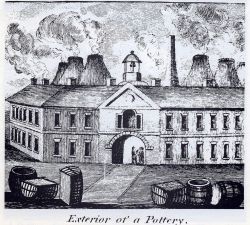 stress in the Potteries was greater than it was ever known before", reported Josiah Wedgwood II as he and Ralph Stevenson represented the pottery manufacturers when the House of Commons enquiry resumed. Stevenson gave evidence that, of approximately 14,000 people who had been employed in the pottery factories only 10,000 could find work. Of 140 pottery companies, about 35 had stopped work within the last two years and 15 or 16 had failed business completely in the last 18 months, more than in the last 10 years. Those that continued to produce wares, were stock piling their finished goods ready for dispatch as soon as the markets were restored, but if that did not happen soon, then more hands would be laid off.
stress in the Potteries was greater than it was ever known before", reported Josiah Wedgwood II as he and Ralph Stevenson represented the pottery manufacturers when the House of Commons enquiry resumed. Stevenson gave evidence that, of approximately 14,000 people who had been employed in the pottery factories only 10,000 could find work. Of 140 pottery companies, about 35 had stopped work within the last two years and 15 or 16 had failed business completely in the last 18 months, more than in the last 10 years. Those that continued to produce wares, were stock piling their finished goods ready for dispatch as soon as the markets were restored, but if that did not happen soon, then more hands would be laid off.
Stevenson also reported that one-third of the Potteries district was employed in producing ware for America, and that if “the American trade was opened, all the goods suited for that market would be taken off as fast as they could be packed”. He described the American market as an increasing one, both in quantity and value, ‘the payments very good, and infinitely better than the home trade. … An open trade to America would remove the distress of the Potters in Staffordshire". He mentioned that he had heard of two Potteries established in America, and “that large offers have been made to workmen to leave this country for America, and that some have actually gone". Economic distress was reported in manufacturing centers throughout Britain and the Orders in Council were withdrawn on June16, 1812.
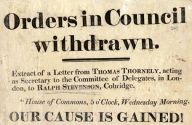
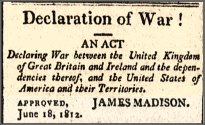 Unaware of this gesture, with deepening depression at home caused by the blockade of trade with Europe, and with the added indignity of having American sailors pressed into service aboard British ships, President Madison proposed war on June 1, 1812. The declaration of war was signed on June 18, 1812
Unaware of this gesture, with deepening depression at home caused by the blockade of trade with Europe, and with the added indignity of having American sailors pressed into service aboard British ships, President Madison proposed war on June 1, 1812. The declaration of war was signed on June 18, 1812
America and Britain were at war for the second time in less than 50 years.
